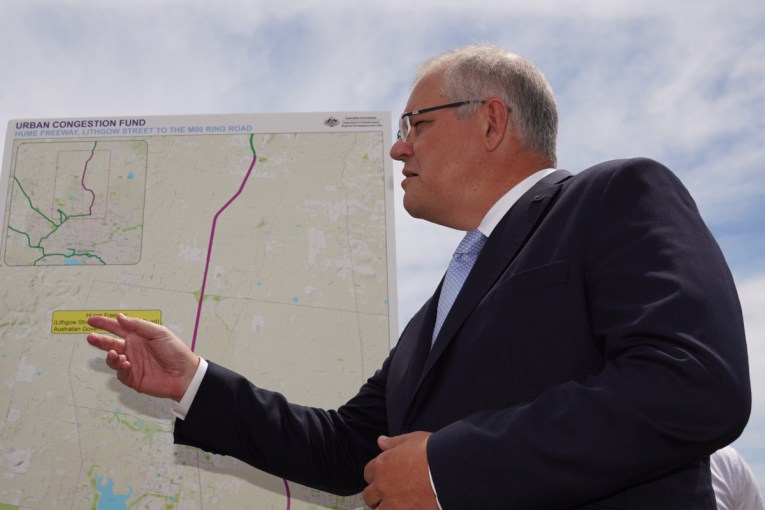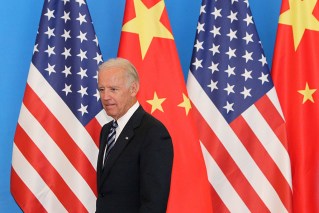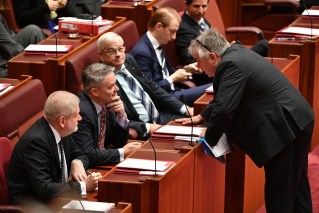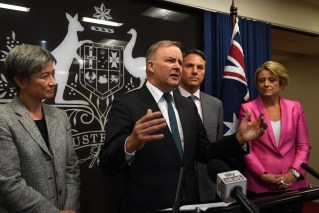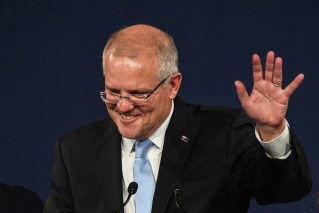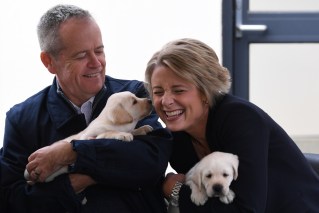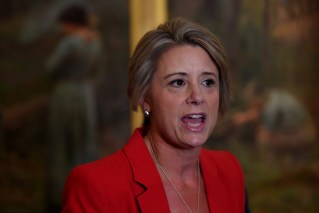Election 2019: Why prime-ministerial candidates always parade their families

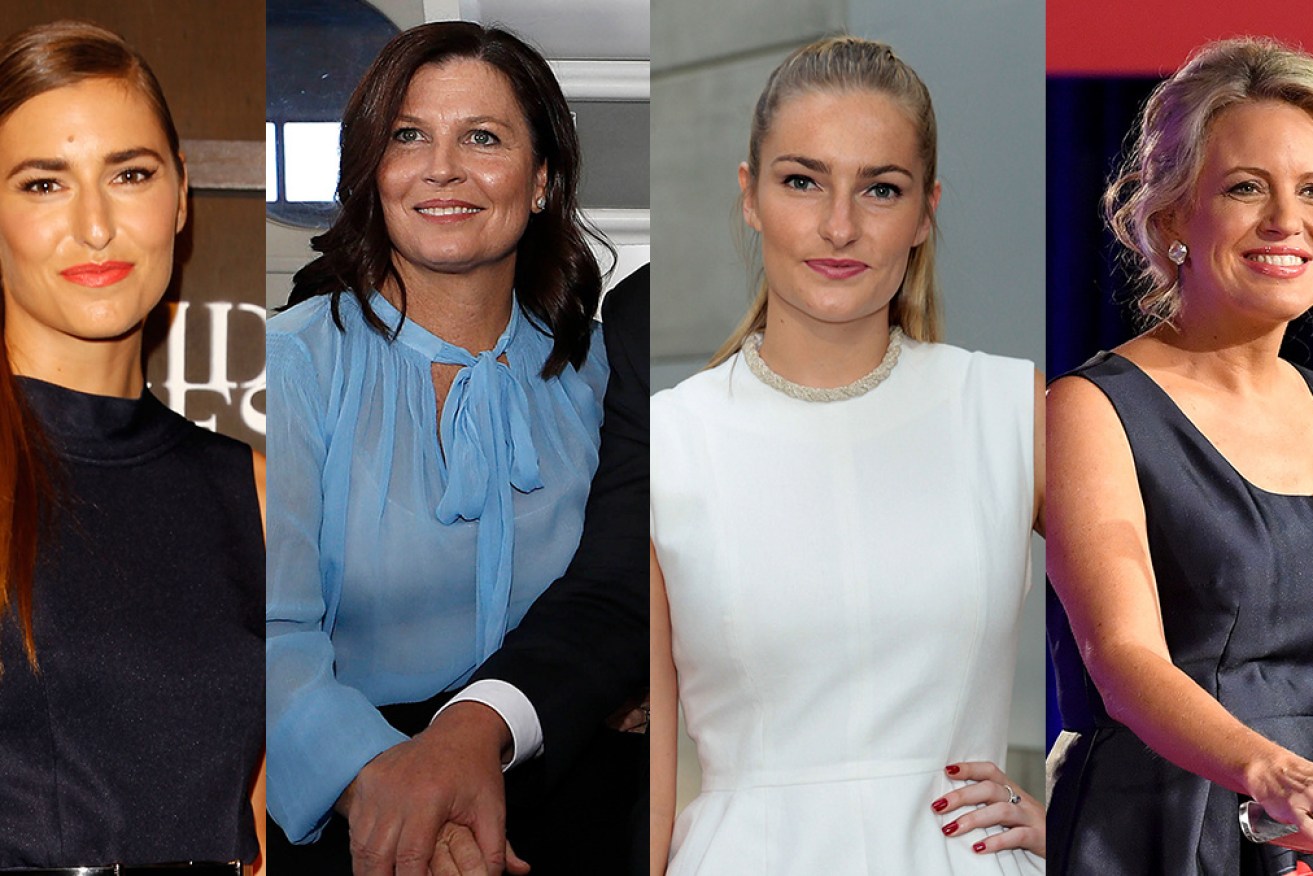
From Frances and Bridget Abbott to Chloe Shorten and Jenny Morrison, our male politicians have played the wife or daughter card. Photo: TND
Federal election campaigns may change from year to year, but one element that remains the same is the visual tricks election strategists use to make their prime-ministerial candidates more appealing to voters.
Tactics to make male candidates look more like a man ‘of the people’ include open-collared shirts, beers in the front bar, and more recently, preparing school lunches or dinner in the family kitchen. However, the most potent visual tactic for humanising a politician is to have their spouse or immediate family accompany them on the campaign trail.
The relatively high profile of both the Prime Minister and Opposition leader’s wives and children this election indicates party strategists have concluded that both men could do with some help in the popularity stakes.
Chloe Shorten may get the headlines as the Labor leader’s ‘secret weapon’ but Jenny Morrison is no less important – both women have been deployed during the campaign to soften their husbands’ images, make a connection with female voters, and demonstrate their man understands the needs and aspirations of Australian families.

Chloe Shorten with deputy Labor Leader Tanya Plibersek. Photo: Getty
Of course, the involvement of their partners and families isn’t always a plus for the politicians vying for the top job in Australian politics.
When he was Liberal opposition leader, John Hewson’s ex-wife, Margaret Hewson, gave an explosive interview to 60 Minutes revealing he’d left her and their young family on Christmas Eve five years before.
Mark Latham’s ex-wife, Gabrielle Gwyther, similarly let fly once her former husband became Labor opposition leader, reportedly claiming he was brutal, sexist, narcissistic and selfish while they were married.
Australia’s first female prime minister, Julia Gillard, was criticised for not having a spouse at all and for ‘living in sin’ with her partner, Tim Mathieson, in The Lodge. Incidentally, the Liberals’ highest-profile unmarried woman, Julie Bishop, also faced similar criticism over her partner, David Panton.

Julia Gillard and partner Tim Mathieson were accused of ‘living in sin’ during her prime ministership. Photo: Getty
Unsurprisingly, it was Tony Abbott who tested the limits of exploiting one’s family for political gain when he was Liberal opposition leader in 2013.
In an obvious attempt to improve his standing with women, Mr Abbott was accompanied by at least one of his three young adult daughters for much of that year’s campaign. Any gains he may have made with female voters would have been destroyed, however, when Mr Abbott described himself on primetime television as “the guy with the not bad-looking daughters”.
While this didn’t stop him from becoming PM in 2013, Mr Abbott later paid the price for having elevated his children to such a high profile, with daughter Frances becoming a prominent supporter of the Yes campaign despite her father’s staunch opposition to marriage equality.

Tony Abbott rolled out his wife and daughters during his campaign – it didn’t always go to plan. Photo: Getty
These incidents are more the exception than the rule, however. In most other cases, spouses and children are believed to improve the public’s views of a political leader.
That’s what former Labor prime minister Kevin Rudd was counting on when his wife, Therese Rein, and daughter Jessica took to women’s magazines and social media in 2012 to support his claim for a return to the prime ministership.
Ms Rein also provided a touching and compelling speech introducing the returned PM Rudd at Labor’s re-election campaign launch in 2013, which was an unusual role for a political spouse in Australia at the time but already a well-used and effective tactic in US election campaigns.

Therese Rein was at Kevin Rudd’s side when he made a new bid for the top job. Photo: Getty
Despite Ms Rein’s heartfelt words not having the desired result in 2013 – the man with the ‘woman problem’, Mr Abbott, easily prevailed over Mr Rudd in that campaign – Labor clearly saw value in using the tactic again in 2019. Mrs Shorten’s glowing introduction of her husband was a highlight at the recent Labor campaign launch.
It may be true that being loved and supported by an intelligent, articulate and photogenic woman makes a political leader more likeable to voters, but there’s no evidence that the likability influences how a voter will cast their ballots.
Mr Abbott proved that in 2013 and Mr Shorten may prove it again this weekend.
Only once likability is completely disproved as an influence on voter choice will political spouses and families stop being a fixture in Australian election campaigns?
